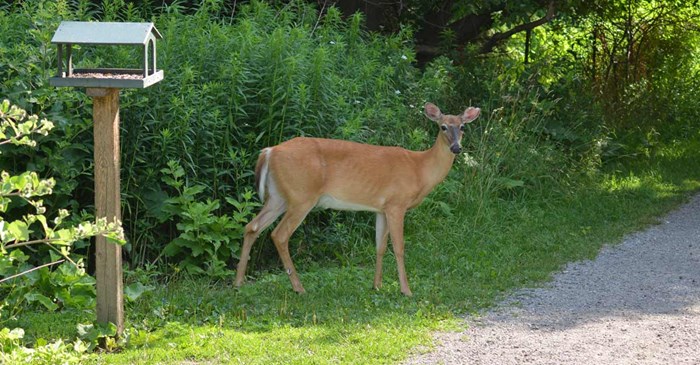In addition to feeding wild songbirds, many people get joy from feeding other wildlife that visit the backyard. Setting out a snack for the rabbits, deer, pheasants, turkeys, and chipmunks in your backyard adds more delight to backyard wildlife viewing. But here’s what you need to know about doing it in a way that’s safe and responsible for the wildlife and other humans living nearby.
Do your homework on feeding rules and laws
Any time you set up a game feeder, wildlife feeder, or wildlife station — especially if you want to feed the deer, rabbits, and chipmunks — just make sure the practice isn’t frowned upon in your area. Research rules governing your homeowner association as well as city ordinances, hunting regulations, and state laws. In some states, for example, feeding deer and other big game is strictly prohibited (though incidental eating from a bird or squirrel feeder is OK). These rules and laws are in place to protect the public and the wildlife, so keep that in mind.
Don't annoy your neighbors
Be a good neighbor and remember that your happy pastime can turn into a nuisance for someone who lives nearby. If your neighbor complains of deer trampling their flower beds or rabbits damaging the bark of their trees and shrubs, be considerate. If mobbing becomes a problem at your feeders, try bringing the feeders in after dark, since you won’t be able to see the animals at that time anyway.
Do clean your feeder
To keep the local wildlife safe and to prevent the spread of infection, all feeders should get regular cleanings. The Cornell Lab of Ornithology recommends once every two weeks. After discarding old feed, take the feeders apart and wash with hot water and mild soap, scrubbing with a nylon bristle brush. Then sanitize in a solution of one part bleach and nine parts hot water. After rinsing, allow them to dry thoroughly before refilling and replacing outside.
Don't offer table scraps
Many of us have memories of Grandma offering scraps of bread, pieces of chicken, and other meal remnants for the backyard critters. But doling out samples of human food can do the wildlife more harm than good. The processed grains in flour are stripped of nutrients animals need from whole grains. Also, perishable foods left outdoors for hours at a time can breed bacteria that can cause foodborne illnesses in wildlife.
Do choose a high-quality blend of natural ingredients
Offer whole foods that mirror what they would find when foraging in nature. Shopping for a wildlife feed mix takes the guesswork out of the question of what to feed the backyard animals.
Lyric Wildlife Food is packed with nutritious goodies that are safe for your backyard menagerie to nibble. It provides vegetables and legumes, steamed crimped corn for easy digestion, and peanuts and black oil sunflower seeds for a nutritious protein source.
